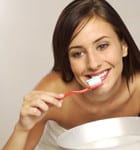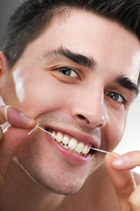 In Leeds, you are constantly being reminded of new products available to help you with you’re oral hygiene: on the TV, in magazines and in the shops. Although it can seem a little over-kill, it isn’t a bad thing either: new and better products come out every month and so it is good that you are reminded of all these current trends- that’s as long as you take notice. A lot of people don’t like change and tend to stick to what they know, which when it comes to oral hygiene can see you come unstuck. You start with a toothbrush and if you take a good look around, there are some gems on the market, especially in the electric range, so it’s best to ‘try and see’ first to get one that suits you. Toothpastes are also diversifying, so again, read what they are designed to do and then try them before settling on the best for you. Then you can back these up with dental flosses, inter-dental brushes and mouthwashes. As you know, using these products three times a day, especially after meals, is ample enough to keep problems at bay- and learn how to use them properly too; it’s amazing how bad some people are at using their brushes correctly and should you need advice about how you are going about all of this, then ask your dentist; they are not only there to patch you up should you get all of this wrong, but they can also advise you on what you are doing wrong as well.
In Leeds, you are constantly being reminded of new products available to help you with you’re oral hygiene: on the TV, in magazines and in the shops. Although it can seem a little over-kill, it isn’t a bad thing either: new and better products come out every month and so it is good that you are reminded of all these current trends- that’s as long as you take notice. A lot of people don’t like change and tend to stick to what they know, which when it comes to oral hygiene can see you come unstuck. You start with a toothbrush and if you take a good look around, there are some gems on the market, especially in the electric range, so it’s best to ‘try and see’ first to get one that suits you. Toothpastes are also diversifying, so again, read what they are designed to do and then try them before settling on the best for you. Then you can back these up with dental flosses, inter-dental brushes and mouthwashes. As you know, using these products three times a day, especially after meals, is ample enough to keep problems at bay- and learn how to use them properly too; it’s amazing how bad some people are at using their brushes correctly and should you need advice about how you are going about all of this, then ask your dentist; they are not only there to patch you up should you get all of this wrong, but they can also advise you on what you are doing wrong as well.









 Oral health for your children should begin even before you can see their first teeth. While the teeth may not be visible to the naked eye, your children already have twenty primary teeth upon birth! Your baby’s gums must be cared for while new teeth are coming in.
Oral health for your children should begin even before you can see their first teeth. While the teeth may not be visible to the naked eye, your children already have twenty primary teeth upon birth! Your baby’s gums must be cared for while new teeth are coming in. The oral health of children relies on the application of much the same principles as does the oral health of adults. The difference is that, if you have children, their oral health is your responsibility because they are in your care. As such, you will need to monitor it to make sure that their teeth are taken care of and they are not developing problems with their mouth that will be an issue for the rest of their lives.
The oral health of children relies on the application of much the same principles as does the oral health of adults. The difference is that, if you have children, their oral health is your responsibility because they are in your care. As such, you will need to monitor it to make sure that their teeth are taken care of and they are not developing problems with their mouth that will be an issue for the rest of their lives. If you have not flossed before then you are missing out on the benefits that this simple activity will convey on the health of your mouth. The high rates of gum disease in the United Kingdom are perhaps evidence that too few people are flossing or are flossing irregularly or not in the right way. If you are unsure about how you should floss and why then talk to your dentist. This article has the basic information.
If you have not flossed before then you are missing out on the benefits that this simple activity will convey on the health of your mouth. The high rates of gum disease in the United Kingdom are perhaps evidence that too few people are flossing or are flossing irregularly or not in the right way. If you are unsure about how you should floss and why then talk to your dentist. This article has the basic information. Most of us in Leeds love a god chew- it can have a strangely calming affect on our stress filled day, strengthen the muscles around the jaw (if done in moderation) and the biggest bonus of all, help reduce the amount we smoke. But there are other reasons why chewing can do your teeth and gums the world of good. If you chew with a sugar free gum or these days, one that has elements of herbal products in such as clove and Echinacea, it helps to massage and stimulate the blood flow in the gums and promote the natural enemy of bacteria- saliva. Your saliva helps to strengthen teeth and neutralize the build up of acids that cause tooth decay. Chewing gum can also help to break down plaque and tartar and reduce the risk of gingivitis and gum disease. Most important of all, it helps to remove any foodstuffs from around the teeth after eating- in fact, if you chew gum during the day, you are far less likely to give into the temptation of ‘snacking’ between meals. Who’d have thought that just by chewing a piece of gum, you could promote so much health in your mouth and body?
Most of us in Leeds love a god chew- it can have a strangely calming affect on our stress filled day, strengthen the muscles around the jaw (if done in moderation) and the biggest bonus of all, help reduce the amount we smoke. But there are other reasons why chewing can do your teeth and gums the world of good. If you chew with a sugar free gum or these days, one that has elements of herbal products in such as clove and Echinacea, it helps to massage and stimulate the blood flow in the gums and promote the natural enemy of bacteria- saliva. Your saliva helps to strengthen teeth and neutralize the build up of acids that cause tooth decay. Chewing gum can also help to break down plaque and tartar and reduce the risk of gingivitis and gum disease. Most important of all, it helps to remove any foodstuffs from around the teeth after eating- in fact, if you chew gum during the day, you are far less likely to give into the temptation of ‘snacking’ between meals. Who’d have thought that just by chewing a piece of gum, you could promote so much health in your mouth and body?

